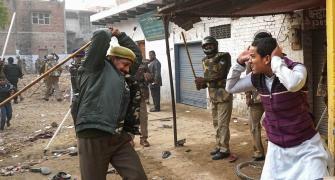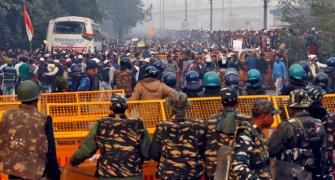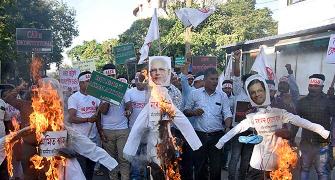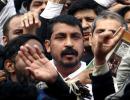People are out on streets as what should have been said inside Parliament was "not said", a court observed in New Delhi on Tuesday as it pulled up the Delhi police after it failed to show any evidence against Bhim Army chief Chandrashekhar Azad who has been accused of inciting people during an anti-Citizenship Amendment Act protest at Jama Masjid on December 20.
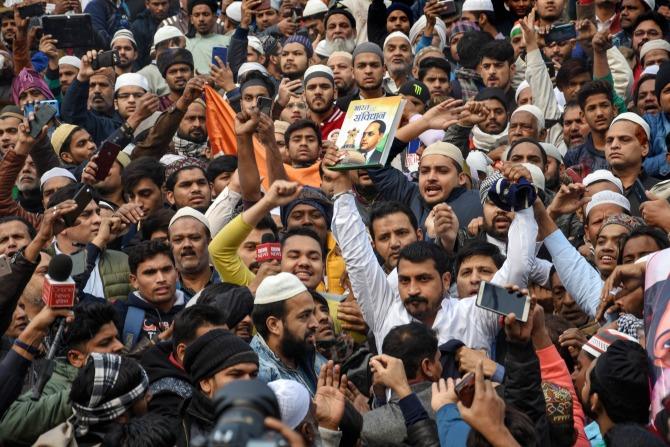
Asserting that it is one's constitutional right to protest, the court, which was hearing Azad's bail plea, also observed that Delhi Police was behaving "as if Jama Masjid was Pakistan".
During the hearing, Additional Public Prosecutor Pankaj Bhatia, appearing for the police, opposed the bail plea, saying Azad had given inflammatory speeches at the premises of Jama Masjid inciting the gathering to carry out violent protests in the area against the amended Citizenship Act.
"Inside Parliament, things which should have been said were not said and that is why people are out on the streets. We have full right to express our views but we cannot destroy our country. We cannot disintegrate it," Additional Sessions Judge Kamini Lau said.
When the judge asked what evidence they had to prove the allegations against Azad, the counsel referred to social media posts of the Bhim Army Chief wherein he calls people to come to Jama Masjid and sit in 'dharna' (protest).
To this, the judge asked, "What is the problem with going to Jama Masjid? What is wrong with 'dharna'? It is one's constitutional right to protest. Where is the violence? What is wrong with any of these posts? Have you read the Constitution?"
"You are behaving as if Jama Masjid was Pakistan and even if it was Pakistan, you can go there and protest. Pakistan was a part of undivided India," the judge said.
The court asked the investigating officer of the police to put on record all the evidence which showed that Azad was allegedly giving inflammatory speeches at the gathering at Jama Masjid and any law which showed that the gathering there was unconstitutional.
It has put up the matter for further hearing on Wednesday.
When Bhatia said that permission was required to hold such protests, the judge remarked, "What permission? Even the Supreme Court has said repeated use of Section 144 (prohibition of gathering of five or more persons, holding of public meetings, and carrying of firearms) of the Indian Penal Code was an abuse of the law....
"I have seen many people and many such cases, where protests happened even outside Parliament. Many of them are chief ministers now. Azad is a budding politician, what is wrong with his protests?"
When the judge asked if the police had any video or audio recording showing objectionable content against Azad, the public prosecutor replied that there was no voice recording and no video of the incident and that there were only statements of witnesses in the case.
"We just have a drone CCTV footage," the public prosecutor said.
The judge rebuked the police, saying,"Do you think Delhi police is so backward that it has no tools to record? There must have been some recording....
"Give me details of the last three FIRs registered against Azad. Also show is there are any prohibition on such gathering. Show any law that prohibits this kind of gathering."
At this, advocate Mehmood Pracha, appearing for Azad, told the court that the accused (Azad) was suffering from Polycythemia, a blood disorder, for which he was not given proper treatment by the Tihar jail authorities till a magistrate court had directed them for the same.
"Azad was deliberately put in harms way. There was no ground for this arrest. He was arrested just because he had to be arrested. There is no whisper of allegation of any of the offences mentioned in the FIR, except that he had given incriminatory speeches," he contended.
"He had logically shown to the world that this new law posed more problems to those belonging to the Scheduled Castes (SC) and Scheduled Tribes (ST) category, than the Muslims. Muslims will have documents, they will not. That is his only offence.
"He was actually reading the Constitution. He has said this CAA, NRC and NPR was against the SC/ST. Most of them does not have one inch of land in India. They will not be able to prove their citizenship," said Pracha.
The judge also observed that Azad, having a law degree, can also protest inside the courts, and went onto add that he probably needs to research more on Ambedkarite philosophy.
"In the colonial era the protests were out on the roads. But your protest can be legal, inside the courts... Azad is in the grassroots level. No one is denying that he is a lawyer and well read and probably an Ambedkarite. Ambedkar was much closer to Muslims, Sikhs and other repressed class of the society.
"He was a rebel of his own kind. Probably Azad has a vague idea of what he wants to say. He is not able to exactly formulate it. He may not be wrong. But probably not able to put it across. If you take up an issue you do your research. And that is missing," the court said.
The bail plea claimed that there was no evidence against the allegations made against Azad in the FIR and his arrest was illegal.
Azad's outfit had called for a protest march from Jama Masjid to Jantar Mantar against the amended Citizenship Act on December 20, without police permission.
Other 15 people arrested in the case were granted bail by the court on January 9.

